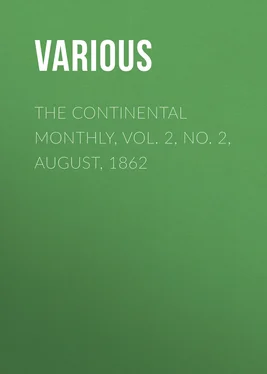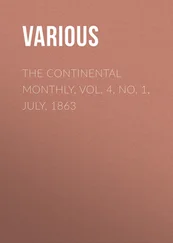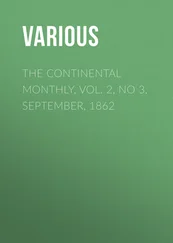Various - The Continental Monthly, Vol. 2, No. 2, August, 1862
Здесь есть возможность читать онлайн «Various - The Continental Monthly, Vol. 2, No. 2, August, 1862» — ознакомительный отрывок электронной книги совершенно бесплатно, а после прочтения отрывка купить полную версию. В некоторых случаях можно слушать аудио, скачать через торрент в формате fb2 и присутствует краткое содержание. Жанр: foreign_antique, periodic, Языкознание, Политика, foreign_edu, на английском языке. Описание произведения, (предисловие) а так же отзывы посетителей доступны на портале библиотеки ЛибКат.
- Название:The Continental Monthly, Vol. 2, No. 2, August, 1862
- Автор:
- Жанр:
- Год:неизвестен
- ISBN:нет данных
- Рейтинг книги:4 / 5. Голосов: 1
-
Избранное:Добавить в избранное
- Отзывы:
-
Ваша оценка:
- 80
- 1
- 2
- 3
- 4
- 5
The Continental Monthly, Vol. 2, No. 2, August, 1862: краткое содержание, описание и аннотация
Предлагаем к чтению аннотацию, описание, краткое содержание или предисловие (зависит от того, что написал сам автор книги «The Continental Monthly, Vol. 2, No. 2, August, 1862»). Если вы не нашли необходимую информацию о книге — напишите в комментариях, мы постараемся отыскать её.
The Continental Monthly, Vol. 2, No. 2, August, 1862 — читать онлайн ознакомительный отрывок
Ниже представлен текст книги, разбитый по страницам. Система сохранения места последней прочитанной страницы, позволяет с удобством читать онлайн бесплатно книгу «The Continental Monthly, Vol. 2, No. 2, August, 1862», без необходимости каждый раз заново искать на чём Вы остановились. Поставьте закладку, и сможете в любой момент перейти на страницу, на которой закончили чтение.
Интервал:
Закладка:
'Yes, I did; a person there ordered me back, but when things began to look serious, Scipio, the negro whom you saw with me, got me out of the hobble.'
'Didn't he tell the gentleman that you were a particular friend of mine, and had met me by appointment at Captain B–'s?' he asked, smiling.
'I believe he did, sir; but I assure you, I said nothing of the kind, and I think the black should not be blamed, under the circumstances.'
'Oh! no; I don't blame him. I think he did a smart thing. He might have said you were my grandmother, if it would have served you, for that low fellow is as fractious as the devil, and dead sure on the trigger.'
'You are very good, sir,' I replied; 'how did you hear of it?'
'A day or two afterward, B– passed here on his way to Georgetown. I had been riding out, and happened to be at the head of my avenue when he was going by. He stopped, and asked if I knew you. Not knowing then the circumstances, I said that I had met you casually at Bucksville, but had no particular acquaintance with you. He rode on, saying nothing further. The next morning I had occasion to go to Georgetown, and at Mr. Fraser's office accidentally heard that Scip—who is well known and universally liked there—was to have a public whipping that evening. Something prompted me to inquire into it, and I was told that he had been charged by B– with shielding a well-known abolitionist at Conwayboro—a man who was going through the up-country distributing such damnable publications as the New-York Independent and Tribune . I knew, of course, it referred to you, and that it wasn't true. I went to Scip and got the facts, and by stretching the truth a little, finally got him off. There was a slight discrepancy between my two accounts of you,' (and here he laughed heartily,) 'and B–, when we were before the Justice, remarked on it, and came d–d near calling me a liar. It was lucky he didn't, for if he had he'd gone to h–l before the place was hot enough for him.'
'I can not tell you, my dear sir, how grateful I am to you for this. It would have pained me more than I can express, if Scip had suffered for doing a disinterested kindness to me.'
Early in the morning we were again on our way, and twelve o'clock found us seated at a dinner of bacon, corn-bread, and waffles, in the 'first hotel' of Georgetown. The Charleston boat was to leave at three o'clock; and, as soon as dinner was over, I sallied out to find Scip. After a half-hour's search I found him on 'Shackelford's wharf,' engaged in loading a schooner bound for New-York with a cargo of cotton and turpentine.
He was delighted to see me, and after I told him I was going home, and might never see him again, I took his hand warmly in mine, and said:
'Scip, I have heard of the disgrace that was near being put upon you on my account, and I feel deeply the disinterested service you did to me; now, I can not go away without doing something for you—showing you in some way that I appreciate and like you.'
'I likes you , massa,' he replied, the tears coming to his eyes; 'I tuk ter you de bery fuss day I seed you, 'case, I s'pose'—and he wrung my hand till it ached—'you pitied de pore brack man. But you karnt do nuffin fur me , massa; I doan't want nuffin; I doan't want ter leab har, 'case de Lord dat put me har arn't willin' I shud gwo. But you kin do suffin, massa, fur de pore brack man, an' dat'll be doin' it fur me , 'case my heart am all in dat. You kin tell dem folks up dar, whar you lib, massa, dat we'm not like de brutes, as dey tink we is. Dat we's got souls, an' 'telligence, an' feelin's, an' am men like demselfs. You kin tell 'em, too, massa—'case you's edication, and kin talk—how de pore wite man am kep' down har; how he'm ragged, an' starvin', an' ob no account, 'case de brack man am a slave. How der chil'ren can't get no schulein', how eben de grow'd-up ones doan't know nuffin—not eben so much as de pore brack slave, 'case de 'stockracy want dar votes, an cudn't get 'em ef dey 'low'd 'em larnin'. Ef your folks know'd all de truf—ef dey know'd how boff de brack an' de pore w'ite man, am on de groun', an' can't git up, ob demselfs—dey'd do suffin—dey'd break de Constertution—dey'd do suffin ter help us. I doan't want no one hurted, I doan't want no one wronged; but jess tink ob it, massa, four million ob bracks, an' nigh so many pore w'ites, wid de bressed Gospil shinin' down on 'em, an' dey not knowin' on it. All dem—ebry one ob 'em—made in de image ob de great God, an' dey driven roun' an' 'bused wuss dan de brutes. You's seed dis, massa, wid your own eyes, an' you kin tell 'em on it; an' you will tell 'em on it, massa;' and again he took my hand while the tears rolled down his cheeks; 'an' Scip will bress you fur it, massa—wid his bery lass breaf he'll bress you; an' de good Lord will bress you, too, massa; he will foreber bress you, for he'm on de side ob de pore an' de 'flicted; his own book say dat, an' it am true, I knows it, fur I feels it har ;' and he laid his hand on his heart, and was silent.
I could not speak for a moment. When I mastered my feelings, I said: 'I will do it Scip; as God gives me strength, I will .'
Reader, I am keeping my word.
This is not a work of fiction. It is a record of facts, and therefore the reader will not expect me to dispose of its various characters on artistic principles—that is, lay them away in one of those final receptacles for the creations of the romancer—the grave and matrimony. Death has been among them, but nearly all are yet doing their work in this breathing, busy world.
The characters I have introduced are real. They are not drawn with the pencil of fancy, nor, I trust, colored with the tints of prejudice. The scenes I have described are true. I have taken some liberties with the names of persons and places, and, in a few instances, altered dates; but the events themselves occurred under my own observation. No one acquainted with the section of country I have described, or familiar with the characters I have delineated, will question this statement. Lest some one who has not seen the slave and the poor white man of the South, as he actually is, should deem my picture overdrawn, I will say that 'the half has not been told!' If the whole were related—if the Southern system, in all its naked ugliness, were fully exposed—the truth would read like fiction, and the baldest relation of fact like the wildest dream of romance.
The overseer was never taken. A letter which I received from Colonel J–, shortly prior to the stoppage of the mails, informed me that Moye had succeeded in crossing the mountains into Tennessee, where, in an interior town, he disposed of the horse, and then made his way by an inland route to the free States. The horse the Colonel had recovered, but the overseer he never expected to see. Moye is now, no doubt, somewhere in the North, and is probably at this present writing a zealous Union man, of somewhat the same 'stripe' as the conductors of the New-York Herald and the Boston Courier .
I have not heard directly from Scipio, but one day last July, after a long search, I found on one of the wharves of South street a coasting captain who knew him well, and who had seen him the month previous at Georgetown. He was at that time pursuing his usual avocations, and was as much respected and trusted as when I met him.
A few days after the tidings of the fall of Sumter were received in New-York, and when I had witnessed the spontaneous and universal uprising of the North which followed that event, I dispatched letters to several of my Southern friends, giving them as near as I could an account of the true state of feeling here, and representing the utter madness of the course the South was pursuing. One of these letters went to my Union acquaintance whom I have called, in the preceding pages, 'Andy Jones.'
Читать дальшеИнтервал:
Закладка:
Похожие книги на «The Continental Monthly, Vol. 2, No. 2, August, 1862»
Представляем Вашему вниманию похожие книги на «The Continental Monthly, Vol. 2, No. 2, August, 1862» списком для выбора. Мы отобрали схожую по названию и смыслу литературу в надежде предоставить читателям больше вариантов отыскать новые, интересные, ещё непрочитанные произведения.
Обсуждение, отзывы о книге «The Continental Monthly, Vol. 2, No. 2, August, 1862» и просто собственные мнения читателей. Оставьте ваши комментарии, напишите, что Вы думаете о произведении, его смысле или главных героях. Укажите что конкретно понравилось, а что нет, и почему Вы так считаете.












